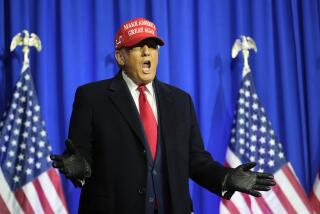Gephardt to Seek Stiffer Trade-Retaliation Law : Commerce: The proposal is aimed at Japan and possibly China.
- Share via
WASHINGTON — House Majority Leader Richard A. Gephardt (D-Mo.) announced plans Tuesday to lead a drive in Congress for a tough law that would encourage more U.S. retaliation against Japanese trading practices he described as “adversarial capitalism.”
“For years, we have been trying to get Japan and other countries to be more like us, to play by our rules,” Gephardt said in a speech before the Institute for International Economics. “We’ve got to continue this fight. But at the same time, if a country wants to exclude our products, they will face similar restrictions on access to the U.S. market. That’s reciprocity and fair play.”
In 1987, Gephardt sponsored a controversial amendment with a similar approach. Although it failed to pass, it helped pave the way for a 1988 law that allows the White House to retaliate against alleged unfair trading practices.
Over the years, the United States has accused Japan of a wide range of unfair practices, including an informal system of collusion among Japanese businesses to keep U.S. firms out of their markets.
The 1988 law--known as “Super 301,” after the basic statute authorizing the government to strike back at countries that do not open their markets to U.S. exports--expired this year.
While the law was in force, many in Congress complained that the Bush Administration had been too timid in invoking it. U.S. Trade Representative Carla Anderson Hills insisted, however, that the sanctions were more effective as a threat in negotiations with other countries than as an end in themselves.
Gephardt’s new proposal, which he plans to introduce with Rep. Sander M. Levin (D-Mich.), would go further than his 1987 amendment, taking away much of the White House’s discretion in deciding when and how to retaliate.
It would apply to countries that account for 15% or more of the U.S. trade deficit and to products that make up at least 10% of those nations’ trade surpluses with the United States.
In practice, that means it would be aimed primarily at Japan and possibly China, an aide to Gephardt said. Targeted industries could include automobiles, automobile parts and electronics.
An Administration official, who requested anonymity, said Gephardt’s plan “sounds like a rehashing of a number of old ideas that have all been rejected in the past for good reasons.”
Gephardt also noted concerns that a free-trade agreement with Mexico, now under negotiation, could give U.S. firms an incentive to relocate their operations across the border to take advantage of lax enforcement of environmental and workers’ rights standards.
To address those fears, the majority leader said he is working on legislation that would allow stockholders to sue corporations in U.S. courts if they do not abide by the environmental and labor laws of the country in which they are doing business.
More to Read
Get the L.A. Times Politics newsletter
Deeply reported insights into legislation, politics and policy from Sacramento, Washington and beyond. In your inbox three times per week.
You may occasionally receive promotional content from the Los Angeles Times.










